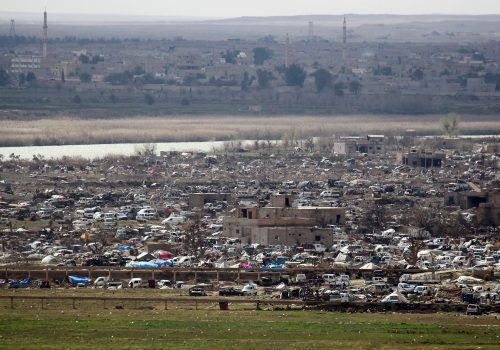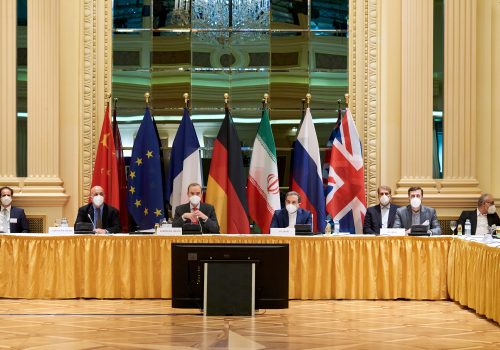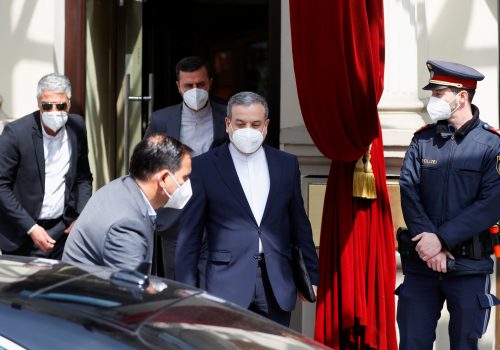Iran sanctions relief will continue funding the ongoing war in Syria
The leaked audiotape of Islamic Republic Foreign Minister Mohammad Javad Zarif has elicited much fanfare in recent weeks. Among the less scrutinized aspects of the tape has been Zarif’s reference to the Islamic Republic’s ongoing support of the Bashar al-Assad regime, including the fact that Iran Air—the flag carrier of the country—continues to transport arms and fighters into the Syrian conflict. As the Joe Biden administration negotiates a potential return to the Joint Comprehensive Plan of Action (JCPOA) in Vienna, Tehran’s backing of the Assad regime should not be left off the table.
Proponents of an unqualified return by President Biden to the 2015 Iran nuclear deal have frequently argued that doing so is necessary to prevent conflict and even war in the Middle East. As the administration has slow-played any such moves in recent months, analysts who have long warned of an impending war with Iran that has never come are once again sounding the alarm bells and urging Biden to return to the JCPOA immediately to prevent war. Yet in Iran’s “thirty-fifth province,” as those close to Supreme Leader Ayatollah Ali Khamenei refer to Syria, a return to the deal wouldn’t prevent war, it would escalate and expand one that has now been raging violently for a decade.
The sanctions reimposed on the Islamic Republic after the US withdrawal from the JCPOA in May 2018 by the Donald Trump administration have, according to a report by the International Monetary Fund, caused Iran’s foreign reserves to dwindle to as low as $4 billion—limiting the regime’s funding for its war machine. But international estimates have indicated that, if the Biden administration were to ease sanctions, Tehran’s foreign reserves would swell to more than $100 billion, rapidly enriching an actor that has shown no hesitation to arm and fund the region’s worst elements. In a recent United Nations Security Council briefing on the Syrian conflict, Secretary of State Antony Blinken remarked that “[W]e have to find a way to do something to take action [in Syria]…That is our responsibility, and shame on us if we don’t meet it.” By cutting off the spigot flooding the Syrian regime’s coffers and military, the secretary of state can meet that responsibility.
On the decade anniversary of the conflict in Syria, which the UN Secretary General António Guterres called “the most dramatic humanitarian crisis the world has faced,” the war has already taken five hundred thousand lives and forced seven million refugees to flee the country. The atrocities committed against the Syrian people and the regional instability that has followed are not accidents. They are fundamental components of the Islamic Republic’s strategy of undermining the Middle East, whether by funding terror groups or propping up dictators. Indeed, when Syrian Prime Minister Riyad Hijab defected to the opposition in 2012, he remarked, “The person who runs the country is not Bashar al-Assad but [Quds Force Commander] Qasem Soleimani.” While Soleimani is no more, the Islamic Republic continues to fund and direct the war against the Syrian people.
The investment is not insignificant. Experts place the Islamic Republic’s annual support for Assad’s war at $15 billion per year. The support to Assad’s regime is not only financial. Tehran-backed Shia militias comprise nearly 80 percent of Syria’s ground forces. Such proxies—including Lebanese Hezbollah, the Fatemiyoun and Zainabiyoun Brigades, Harakat al-Nujaba, and Asaib ahl Al-Haq—were the main ground forces besieging rebel-held cities and towns of Eastern Ghouta, Zabadani, Madaya, and Aleppo. All told, Tehran recruited an estimated eighty thousand militia fighters from Afghanistan, Pakistan, Iraq, and beyond to fight a “holy war” in Syria.
Though some promoted the Islamic Republic’s involvement in Syria as defense against the Islamic State of Iraq and al-Sham (ISIS), the use of starvation as a weapon of war and preventing medicine and basic necessities from reaching civilians were among Iran’s primary tactics. Dozens of children starved to death and hundreds more died due to lack of medicine, leading UN Secretary General Ban Ki-moon to declare in 2016 that “the use of starvation as a weapon of war is a war crime.”
Syrian activists have long urged the international community to take further action on the Islamic Republic’s crimes in the country, including investigating its campaign of “wide-scale ethnic cleansing of Sunni villages.” Indeed, the Barack Obama administration sanctioned Iran’s intelligence ministry and the Islamic Revolutionary Guard Corps’ notorious Quds Force, including its former commander Soleimani, for “supporting the Syrian regime as it continues to commit human rights abuses against the people of Syria.”
Despite the insistence by some Western journalists that the selection of so-called moderates in Iran would reform the regime’s regional posture, the crimes against humanity have continued. Since 2013, the Islamic Republic has sent up to twenty thousand Afghan refugees to fight in Syria, including hundreds of child soldiers as young as fourteen years old. Tehran’s practice of using children to fight on its behalf, a flagrant violation of the United Nations’ Convention of the Rights of the Child, has been described by Human Rights Watch as a war crime. It’s only one of many.
According to a cable released by WikiLeaks in 2012, German officials reported that the Islamic Republic aided Assad regime’s chemical weapons program, which included “the construction design and equipment to annually produce tens to hundreds of tons of precursors for VX, sarin, and mustard.” In addition to supporting the production of internationally-banned weapons, Tehran also provided technology for deploying weapons, including the Falaq-2 330mm rocket launcher used in the 2013 Ghouta chemical attack, which killed hundreds of children.
Assad’s crimes in Syria, with the aiding and abetting of the Islamic Republic, have torn the country apart and left it nearly unrecognizable. The ripple effects of the Syrian crisis are felt in refugee camps across southern Europe and the resulting rightwing nationalism wreaking havoc on democracies across the continent. The Islamic Republic’s policy of sowing chaos has succeeded.
US sanctions on Iran, however, have proven to be effective in controlling some of the activities of terrorist groups under the command of the Islamic Republic. Hezbollah, for example, has admitted the impact and has been forced to request support from the Lebanese public for its ongoing terrorist operations. This includes Syria, where regime-backed militias reported that Tehran could no longer afford their salaries. These troubles, in addition to the regime’s aforementioned balance of payments crisis and its dire economic situation, leaves the Islamic Republic in a truly desperate position. It is one the US should use to force concessions on the regime’s war machine in Syria.
These facts are seemingly not lost on the new American administration. Secretary Blinken has admitted that the Obama administration’s policies in the Middle East “failed to prevent a horrific loss of life.” Now, with a second opportunity to prevent further bloodshed, if President Biden and his team truly want to prevent war, a spiral in the Middle East, and the further expansion of an emboldened Russia who “forced Iran to send ground forces to Syria” according to the leaked Zarif tape, they must not empower a belligerent Tehran to wage an even bloodier war. Reentering the JCPOA would do just that.
If the Islamic Republic is looking for sanctions relief, the Biden administration should demand that it extract all militia personnel, end support for the Assad regime’s military operations, and cease cooperation on weapons development—including chemical weapons. If the Islamic Republic is unwilling to take these most fundamental, humanitarian steps, it cannot and should not be trusted with the tens of billions of dollars that sanctions relief will provide.
The necessity of controlling Tehran’s expansionist aims in the Middle East is not a partisan one. In March, more than one hundred members of Congress from both parties urged the Biden administration to use its leverage to pressure the regime that has “sowed chaos in Syria.” The Islamic Republic, flush with cash unfrozen by sanctions relief, will not tend to the needs of its citizens. It will sow further chaos.
If the US returns to the JCPOA without extracting concessions from the regime, specifically on its murderous campaign in Syria, the death toll will only continue to grow. If there is a war to be stopped, it is the war the Islamic Republic is already waging in Syria on behalf of Assad. Focusing only on the nuclear threat alone will not prevent war—it will fund it.
Kenan Rahmani is senior policy advisor at Americans for a Free Syria (AFS) and senior advocacy advisor at The Syria Campaign. Follow him on Twitter @KenanRahmani.
Cameron Khansarinia is policy director of the Washington-based National Union for Democracy in Iran (NUFDI). Follow him on Twitter @khansarinia.
Image: Syria's President Bashar al-Assad meets with Iran's Foreign Minister Mohammad Javad Zarif in Damascus, Syria in this handout picture released on May 12, 2021. SANA/Handout via REUTERS


